Delilah S. Dawson's Blog, page 29
August 1, 2012
MYSTERIOUS MADAM MORPHO cover reveal!
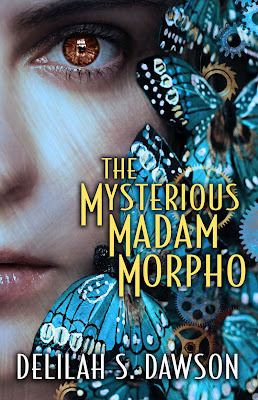
THE MYSTERIOUS MADAM MORPHO out October 2 with Pocket Star, already on Amazonknown around these parts as BLUD 1.5
Taking place after Wicked as They Come, this original eBook features a mysterious lady and a reclusive mechanical genius who find love and danger in a traveling circus.
Hint: It opens with Criminy and Letitia before jumping to the new romance.
*
Published on August 01, 2012 12:39
July 31, 2012
On writer's block, or GIVE ME ALL YOUR INVISIBLE GUNS, MICHAEL
Someone asked penmonkey extraordinaire Chuck Wendig how to get over performance anxiety as a writer. You can see the full question and Chuck's brilliant answer here, on terribleminds.com. I had the same problem for.... oh, fifteen years or so. Here's how I got over it, in one simple phrase.
Don't write THE story; write A story.
Oh, that's not enough? Here's an object lesson from pop culture. Watch this 11-second clip.
That's Michael Scott from The Office, explaining why he ruins every single scene in his improv class by crashing through an invisible door with an invisible gun and going into FBI stand-off mode. No one else can tell an interesting story because Michael always wants to tell THE MOST EXCITING STORY because he's worried that without invisible guns, he'll be powerless. So the teacher confiscates all of his invisible guns.
So let's assume WRITING THE WORLD'S BEST STORY = Michael busting into a room with guns. Or, in the case of a writer, a golden gun. Because we all want to write the perfect story, right?
I would like to join Chuck in collecting all of your invisible guns.
Let's break it down.
1. THERE ARE INFINITE GREAT STORIES THAT DO NOT INVOLVE GUNS.
Put 100 people in a room. Tell them, "A normal boy named Harry goes to a new school and something weird happens. Write a story." You will get 100 vastly different stories. Harry will be different. His new school will be different. The weird thing that happens will be different. What will set the stories apart won't be the concept--it'll be the writing. J.K. Rowling didn't do anything new-- she just did it really well. And without a single gun.
2. THE WRITING, NOT THE GUN, MAKES THE STORY AMAZING.
Just as an improv scene's success is based on the actor's skills and experience and not the invisible gun, the writing is more important to a story than the subject. You must write stories in order to improve as a writer. It doesn't matter how great your story idea is. It's not going to be THE perfect story. It's not going to be a bestseller. It's not going to sell for a bajillion dollars. You have to write a lot of crap before you get even close to that, so you might as well assume you're going to write crap for a while. Adding a gun isn't going to make your crap look like gold.
3. BEAT YOUR GUN INTO A PLOWSHARE AND GET TO WORK.
Go to writing groups. Go to critique groups. Do flash fiction. Challenge yourself to tell 140-character stories on Twitter. Force yourself to share your stories publicly, as the public can always tell crap from gold. Sacrifice your work and your pride and learn, bit by painful bit, to accept criticism. Everyone starts writing crap. No one gets to start at the front of the line. Get used to the idea that there are tons of stories out there, waiting to be told, and that none of them are THE ONE. You don't see Eddie Izzard or Louis CK pulling out an invisible gun every five minutes during their stand-up routines, do you? No.
4. LEARN TO RECOGNIZE WHEN YOU HAVE UNEARTHED GOLD WITH YOUR GUN-PLOW.
Maybe you have a flash fiction piece that received some favorable comments. Maybe you sold a short story. Maybe someone in your writing group said something nice about a sentence or a character. Figure out what made that story or character work. Maybe you're good at humor, action, deep characters, clever twists. DO THAT THING MORE. That right there? That's your real weapon.
5. REMEMBER THAT GOLDEN GUNS BEGIN AS LUMPS OF GOLD.
Let's say you've internalized 1-4. You're getting pretty good at this writing thing. You have a great idea, a character and a story that excite you. You have the raw materials to make that golden gun. Should you sit down at the keyboard and think OMIGOD, THIS HAS TO BE PERFECT?
NO. Because nobody makes a golden gun on the first try.
Just remember that the first draft is going to be crap. You can always go back and fix it, polish it up, add more elements to your story. It's never too late to change something or, hell, rip the entire thing to shreds and start over. Lots of great and published writers do this with every book. I saw no less than 3 traditionally published, well-known writers bemoaning their huge revision letters on Twitter just this morning.
Great writing takes time. Great stories take time and reworking. Your story doesn't have to be perfect after the first draft, your second draft... or your seventeenth draft. Ask me how I know.
In conclusion, NO ONE WINS BY STARTING OUT WITH A GUN.
Now forget being perfect and go write A story, ANY story. YOUR story.
*

Don't write THE story; write A story.
Oh, that's not enough? Here's an object lesson from pop culture. Watch this 11-second clip.
That's Michael Scott from The Office, explaining why he ruins every single scene in his improv class by crashing through an invisible door with an invisible gun and going into FBI stand-off mode. No one else can tell an interesting story because Michael always wants to tell THE MOST EXCITING STORY because he's worried that without invisible guns, he'll be powerless. So the teacher confiscates all of his invisible guns.
So let's assume WRITING THE WORLD'S BEST STORY = Michael busting into a room with guns. Or, in the case of a writer, a golden gun. Because we all want to write the perfect story, right?
I would like to join Chuck in collecting all of your invisible guns.
Let's break it down.
1. THERE ARE INFINITE GREAT STORIES THAT DO NOT INVOLVE GUNS.
Put 100 people in a room. Tell them, "A normal boy named Harry goes to a new school and something weird happens. Write a story." You will get 100 vastly different stories. Harry will be different. His new school will be different. The weird thing that happens will be different. What will set the stories apart won't be the concept--it'll be the writing. J.K. Rowling didn't do anything new-- she just did it really well. And without a single gun.
2. THE WRITING, NOT THE GUN, MAKES THE STORY AMAZING.
Just as an improv scene's success is based on the actor's skills and experience and not the invisible gun, the writing is more important to a story than the subject. You must write stories in order to improve as a writer. It doesn't matter how great your story idea is. It's not going to be THE perfect story. It's not going to be a bestseller. It's not going to sell for a bajillion dollars. You have to write a lot of crap before you get even close to that, so you might as well assume you're going to write crap for a while. Adding a gun isn't going to make your crap look like gold.
3. BEAT YOUR GUN INTO A PLOWSHARE AND GET TO WORK.
Go to writing groups. Go to critique groups. Do flash fiction. Challenge yourself to tell 140-character stories on Twitter. Force yourself to share your stories publicly, as the public can always tell crap from gold. Sacrifice your work and your pride and learn, bit by painful bit, to accept criticism. Everyone starts writing crap. No one gets to start at the front of the line. Get used to the idea that there are tons of stories out there, waiting to be told, and that none of them are THE ONE. You don't see Eddie Izzard or Louis CK pulling out an invisible gun every five minutes during their stand-up routines, do you? No.
4. LEARN TO RECOGNIZE WHEN YOU HAVE UNEARTHED GOLD WITH YOUR GUN-PLOW.
Maybe you have a flash fiction piece that received some favorable comments. Maybe you sold a short story. Maybe someone in your writing group said something nice about a sentence or a character. Figure out what made that story or character work. Maybe you're good at humor, action, deep characters, clever twists. DO THAT THING MORE. That right there? That's your real weapon.
5. REMEMBER THAT GOLDEN GUNS BEGIN AS LUMPS OF GOLD.
Let's say you've internalized 1-4. You're getting pretty good at this writing thing. You have a great idea, a character and a story that excite you. You have the raw materials to make that golden gun. Should you sit down at the keyboard and think OMIGOD, THIS HAS TO BE PERFECT?
NO. Because nobody makes a golden gun on the first try.
Just remember that the first draft is going to be crap. You can always go back and fix it, polish it up, add more elements to your story. It's never too late to change something or, hell, rip the entire thing to shreds and start over. Lots of great and published writers do this with every book. I saw no less than 3 traditionally published, well-known writers bemoaning their huge revision letters on Twitter just this morning.
Great writing takes time. Great stories take time and reworking. Your story doesn't have to be perfect after the first draft, your second draft... or your seventeenth draft. Ask me how I know.
In conclusion, NO ONE WINS BY STARTING OUT WITH A GUN.
Now forget being perfect and go write A story, ANY story. YOUR story.
*
Published on July 31, 2012 07:51
July 29, 2012
flash fiction: Gatsby
Instructions:
Write a short story about a character named Gatsby in 10 sentences.
*
Gatsby was all she had left, after the fire. He reclined on the inn's dark wood floor in an elegant heap, silently judging her with shimmering yellow eyes. No matter what she did, no matter how many doors she closed in the suite, the cat was there beside her, posing against a bookshelf or in a sunbeam like a black-and-white photo from Vanity Fair. Bathing himself with one elegant paw, running it over and over his black fur in the style of a panther hidden in the jungle trees, waiting to strike from the darkness. Reminding her of the pretentious impotence of the life she'd left behind. She had though herself so superior and manipulative, winning the heart of a rich man's son. And she had thought herself so clever and strong, winning her freedom and fortune with one twist of a stove knob and the flick of a match. If not for her dead husband's cat, the damnable, accusing, purebred, thinks-his-butt-don't-stink cat, she could have finally been happy. That's what she told herself as she picked up the axe. That's what she told herself as she hacked and hacked and hacked at the empty space on the elegant parquet floor, trying to kill the thing that was already gone yet would never really leave.
Found on the floor of my studio while cleaning.
*
Gatsby was all she had left, after the fire. He reclined on the inn's dark wood floor in an elegant heap, silently judging her with shimmering yellow eyes. No matter what she did, no matter how many doors she closed in the suite, the cat was there beside her, posing against a bookshelf or in a sunbeam like a black-and-white photo from Vanity Fair. Bathing himself with one elegant paw, running it over and over his black fur in the style of a panther hidden in the jungle trees, waiting to strike from the darkness. Reminding her of the pretentious impotence of the life she'd left behind. She had though herself so superior and manipulative, winning the heart of a rich man's son. And she had thought herself so clever and strong, winning her freedom and fortune with one twist of a stove knob and the flick of a match. If not for her dead husband's cat, the damnable, accusing, purebred, thinks-his-butt-don't-stink cat, she could have finally been happy. That's what she told herself as she picked up the axe. That's what she told herself as she hacked and hacked and hacked at the empty space on the elegant parquet floor, trying to kill the thing that was already gone yet would never really leave.
Found on the floor of my studio while cleaning.
Published on July 29, 2012 08:33
July 28, 2012
what next?
I'm about to finish up my last big deadline until book 3 is due this winter. Unless something really exciting happens, that means I have a couple of months of freedom.
SWEET FREEDOM!
And that means I'm going to need to pick up a new project. Here are the front runners:
1. New MG idea - THE WIND LASS - adventure, girl protagonist, kinda steampunky, kinda magic, involves travel by camel-pulled balloon and breaking a curse.
2. Finish BLACK PARADE, a YA about a contemporary teen girl who goes into a coma and ends up in Sang as a Bludman. Inspired by the video/song The Black Parade by My Chemical Romance.
3. Finish SPARROWHAWK, a historical fantasy YA about a teen girl, underground goblins, and The Crystal Palace in London. Inspired by the ball in Labyrinth. And yes, the Goblin King *is* rather hot.
4. Polish PAYBACK, a contemporary YA about the first day of dystopian rule. What would happen if credit card companies could kill you? It's finished but needs a lot of revision.
5. Something entirely different.
Show of hands? Bueller? Bueller?
What should I work on next?
*
SWEET FREEDOM!
And that means I'm going to need to pick up a new project. Here are the front runners:
1. New MG idea - THE WIND LASS - adventure, girl protagonist, kinda steampunky, kinda magic, involves travel by camel-pulled balloon and breaking a curse.
2. Finish BLACK PARADE, a YA about a contemporary teen girl who goes into a coma and ends up in Sang as a Bludman. Inspired by the video/song The Black Parade by My Chemical Romance.
3. Finish SPARROWHAWK, a historical fantasy YA about a teen girl, underground goblins, and The Crystal Palace in London. Inspired by the ball in Labyrinth. And yes, the Goblin King *is* rather hot.
4. Polish PAYBACK, a contemporary YA about the first day of dystopian rule. What would happen if credit card companies could kill you? It's finished but needs a lot of revision.
5. Something entirely different.
Show of hands? Bueller? Bueller?
What should I work on next?
*
Published on July 28, 2012 09:32
July 25, 2012
my past life
I had a revelation today while glowering through the dishes and cooking dinner.
I know who I was in a past life.
Consider this:
THINGS DELILAH LOVES:
* antiquated fashion, especially with dapper jackets, vests, breeches, hats, and boots
* boys with long hair
* riding horses, shooting bows and guns, and gallivanting through the forest
* art, poetry, books, and writing
* pretty things
* pocket watches
* swoopy velvet couches and, specifically, lounging on them
* damask
THINGS DELILAH DISLIKES
* cleaning
* cooking
* doing laundry
* doing anything she's told, ever
I think it's clear. In my past life, I was either Lord Akeldama or Lord John Gray.
I was a fop, old chap, and a darned good'un.
Let's get back to that post-haste, yes?
*
Anybody else know who they were in a past life, even a bookish one?
*
I know who I was in a past life.
Consider this:
THINGS DELILAH LOVES:
* antiquated fashion, especially with dapper jackets, vests, breeches, hats, and boots
* boys with long hair
* riding horses, shooting bows and guns, and gallivanting through the forest
* art, poetry, books, and writing
* pretty things
* pocket watches
* swoopy velvet couches and, specifically, lounging on them
* damask
THINGS DELILAH DISLIKES
* cleaning
* cooking
* doing laundry
* doing anything she's told, ever
I think it's clear. In my past life, I was either Lord Akeldama or Lord John Gray.
I was a fop, old chap, and a darned good'un.
Let's get back to that post-haste, yes?
*
Anybody else know who they were in a past life, even a bookish one?
*
Published on July 25, 2012 17:36
July 24, 2012
junk in/from my steampunk trunk
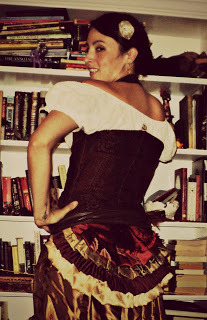
One of my favorite things about dressing steampunk is the way that having a big caboose makes your waist look smaller. Whether you're adding a bustle, a ruffle, or side panniers, big hips and a bodacious booty are actually a plus.
And when you have an amazing and talented friend who can mastermind turning a bodacious booty bustle ruffle into a PURSE?
Yeah.
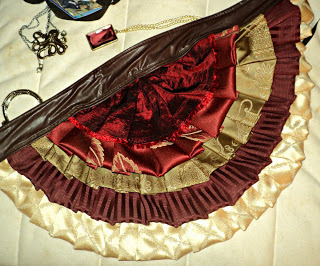
There it is. It's gorgeous. Made from a bag of fabric scraps from Damsel in this Dress, the bustle has a hidden secret.
PENS.
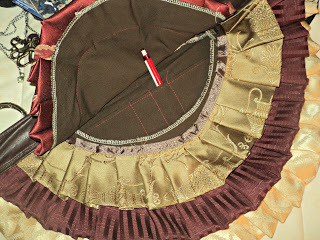
No, really. It's a PURSE. The top ruffles flip cleverly open to reveal a big purse, including four specially sized compartments for my phone, camera, and Sharpies. Everything I need at a con or event, right there on my butt.
I am so very HAPPY.
My friend Stephanie makes this kind of magic all the time. Not only is she an incredibly talented seamstress with mad design skills and a fantastic eye, but she's also one of the nicest, kindest, most generous, most supportive people I've ever met.
I've been a little down lately, what with all the hate and negativity and political commentary that keeps popping up on Facebook and Twitter. I have a bad habit of retreating into books and writing when I start to doubt my faith in humanity. But having good friends and making beautiful things helps me find my center again. Thanks, Steph, for totally making my day! The Rice Krispy Treats helped, too. <3
Oh, and if you call it a fannypack? I'll thwap you with my parasol.
*
Published on July 24, 2012 16:41
July 22, 2012
on perspective and cockroaches
Last night, I sat under an old gazebo and watched cockroaches do it.
I know, I know-- it's totally gross.
But it was also... kind of fascinating. They had gathered around a scuffed place on the wood, crawling up and around each other. About six of them. Like they were planning something. World domination, perhaps? And then two of them had a conversation with their antennae. And then they did it, right there.
If this scene had occurred in my house, I would have been disgusted. Much smashing and screeching and the oozing of cream-filled carapaces would have occurred. But because it happened outside, in the dark, in an old gazebo, surrounded by drizzle, after a margarita and at least ten feet away from me, it was educational. And fascinating.
I think it's a good reminder for writers that perspective can change a scene entirely.
The action? Something so simple. Two roaches mating. Unfortunately, it happens millions of times a day, all over the world.
But the scene is different from their perspective. From the creepy eyes of their pals. From me, an animal trivia buff. From my friend, who was far more disgusted than I was, possibly because she was still eating her cupcake. And the scene would have been far different, had it taken place in my kitchen, in my bathroom, in Buckingham Palace, on the floor of a McDonalds, or in the confines of a zoo terrarium. It would have been really different if they had been irradiated, ten-foot-tall mutant roaches.
Now forget the roaches and think about two people having a discussion and all the little things that could change the scene completely. How cold or hot is it, and is the cold or hot affecting the people involved? Is it a busy street with onlookers, or a quiet scene in the living room, or a stolen scene in a closed cemetery? Is it two guys, two girls, a guy and a girl? Do they have a history together? Is one scared or angry? Did one of the characters suffer a tragedy or a victory today? And are you writing first person or third or omniscient third? And, most importantly, how would they react if there was suddenly an enclave of roaches hellbent on making baby roaches just a few feet away?
Because here's another universal truth: it's impossible to watch cockroaches doin' it and not talk about cockroaches doin' it.
You learn something new every day... it's just not usually that gross.
*

I know, I know-- it's totally gross.
But it was also... kind of fascinating. They had gathered around a scuffed place on the wood, crawling up and around each other. About six of them. Like they were planning something. World domination, perhaps? And then two of them had a conversation with their antennae. And then they did it, right there.
If this scene had occurred in my house, I would have been disgusted. Much smashing and screeching and the oozing of cream-filled carapaces would have occurred. But because it happened outside, in the dark, in an old gazebo, surrounded by drizzle, after a margarita and at least ten feet away from me, it was educational. And fascinating.
I think it's a good reminder for writers that perspective can change a scene entirely.
The action? Something so simple. Two roaches mating. Unfortunately, it happens millions of times a day, all over the world.
But the scene is different from their perspective. From the creepy eyes of their pals. From me, an animal trivia buff. From my friend, who was far more disgusted than I was, possibly because she was still eating her cupcake. And the scene would have been far different, had it taken place in my kitchen, in my bathroom, in Buckingham Palace, on the floor of a McDonalds, or in the confines of a zoo terrarium. It would have been really different if they had been irradiated, ten-foot-tall mutant roaches.
Now forget the roaches and think about two people having a discussion and all the little things that could change the scene completely. How cold or hot is it, and is the cold or hot affecting the people involved? Is it a busy street with onlookers, or a quiet scene in the living room, or a stolen scene in a closed cemetery? Is it two guys, two girls, a guy and a girl? Do they have a history together? Is one scared or angry? Did one of the characters suffer a tragedy or a victory today? And are you writing first person or third or omniscient third? And, most importantly, how would they react if there was suddenly an enclave of roaches hellbent on making baby roaches just a few feet away?
Because here's another universal truth: it's impossible to watch cockroaches doin' it and not talk about cockroaches doin' it.
You learn something new every day... it's just not usually that gross.
*
Published on July 22, 2012 06:23
July 19, 2012
scattered thoughts on editing
A big revision is due tomorrow. I haven't missed a deadline yet. I'm not halfway done on this pass. So let's make this quick.
1. Try not to use an unusual word twice on one page. "The" or "man" is fine. "Frittered" or "posthumous" not so much. Words should never catch a reader's attention enough to draw them out of the story.
2. Remember to switch up your nouns when referring to the same thing over and over again on the same page. He/him/the old man/ the sailor/the grizzled seaman/Jack. Repetition is bad news.
3. If you forget a little detail, keep a list nearby as a reminder. I have one that says things like "hats off on the ship" and "remember gloves" and "neckline of blue dress." Consistency is important, especially when you make one change that ripples down. Your readers will notice minor details that you might lose track of while revising.
4. Every writer and every book has a word or phrase that's overused. In general, I use "little" a little too much. In this book, everything is done "darkly". I suggest going to Wordle and creating a word cloud for your book. The phrase/word you use the most will be the biggest word in the cloud, and then you can use Find to kill it throughout the document.
5. When you're in a big rush, don't stop to blog, even though it's important.
1. Try not to use an unusual word twice on one page. "The" or "man" is fine. "Frittered" or "posthumous" not so much. Words should never catch a reader's attention enough to draw them out of the story.
2. Remember to switch up your nouns when referring to the same thing over and over again on the same page. He/him/the old man/ the sailor/the grizzled seaman/Jack. Repetition is bad news.
3. If you forget a little detail, keep a list nearby as a reminder. I have one that says things like "hats off on the ship" and "remember gloves" and "neckline of blue dress." Consistency is important, especially when you make one change that ripples down. Your readers will notice minor details that you might lose track of while revising.
4. Every writer and every book has a word or phrase that's overused. In general, I use "little" a little too much. In this book, everything is done "darkly". I suggest going to Wordle and creating a word cloud for your book. The phrase/word you use the most will be the biggest word in the cloud, and then you can use Find to kill it throughout the document.
5. When you're in a big rush, don't stop to blog, even though it's important.
Published on July 19, 2012 10:50
July 17, 2012
a musical journey in an airship brothel
Here's the Spotify playlist I listened to while furiously hammering out the first draft of WICKED AS SHE WANTS, aka Blud book 2:
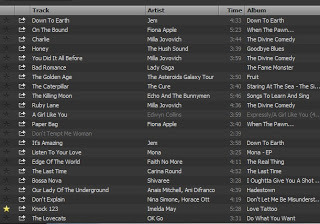
It's long. Etherial, girl-power-y, magical.
Now, here's the playlist I've been mainlining like powdered cupcake crack during one of the toughest, most deeply surgical revisions I've ever done.
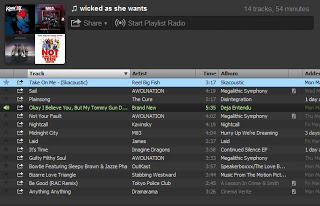 http://open.spotify.com/user/delilahsdawson/playlist/4IpahEp659c2f1wKPA4SOv
http://open.spotify.com/user/delilahsdawson/playlist/4IpahEp659c2f1wKPA4SOv
It's shorter. Vicious. Hammering. With bursts of beauty, but dark and relentless.
The book changed, and the music changed with it. *I* changed with it.
The book you want to write isn't always the book you end up writing, and that's not always the book you end up with.
The good news? The end result is usually a lot better.
Remember that change can be good. Find the music to get you there.
*
Note: Click on the images to listen along.

It's long. Etherial, girl-power-y, magical.
Now, here's the playlist I've been mainlining like powdered cupcake crack during one of the toughest, most deeply surgical revisions I've ever done.
 http://open.spotify.com/user/delilahsdawson/playlist/4IpahEp659c2f1wKPA4SOv
http://open.spotify.com/user/delilahsdawson/playlist/4IpahEp659c2f1wKPA4SOvIt's shorter. Vicious. Hammering. With bursts of beauty, but dark and relentless.
The book changed, and the music changed with it. *I* changed with it.
The book you want to write isn't always the book you end up writing, and that's not always the book you end up with.
The good news? The end result is usually a lot better.
Remember that change can be good. Find the music to get you there.
*
Note: Click on the images to listen along.
Published on July 17, 2012 09:05
July 16, 2012
How to Know When Your Rejection Bladder is Busted
Last week, I discussed dealing with rejection as a writer. But that post assumes that you're determined to keep going.
What happens when you want to give up?
Here are some questions to ask yourself when you're trying to decide how badly you want to be traditionally published.
1. Do you want this?
2. Do you really, really want this? So badly that it obsesses you?
3. If you quit, would you miss it? Would you hate yourself? Would you worry that you had given up just before you finally made that breakthrough?
4. How far are you willing to go? Will you take a class? Find a critique partner or group? Go to a conference? Pay a professional editor? Buy some books on writing? Read some blogs? Spend more time reading?
5. Have you taken a really good look at why your query or story isn't working? Have you requested and received criticism? Have you applied it? Are you still making the same mistakes?
6. If you're querying, have you exhausted the entire pool of agents? Have you submitted your work to small and large presses that accept unagented work? Did any agents offer to look again after a requested revision? Are there any other contacts or avenues you can try, like signing up for pitch sessions at a conference?
7. If you have answered yes to every question, have you started writing your next book?
The bald truth is that getting published is hard as hell. It takes work. You have to write millions of words. You have to read thousands of books. You have to take classes and read books on craft and plot and do internet research. You have to open yourself up to criticism, knowing that the criticism is going to hurt your ego. You have to constantly strive to perfect your writing and know that wherever you are in your journey, there's always something new to learn.
You will see people succeed all around you. You will walk into bookstores and instead of thinking, "Yay, books!", you will think, "These guys are lucky bastards." Even if those lucky bastards spent ten years getting their first book on shelves and ten more years getting noticed, you will see only their success, never their struggle.
You will feel inadequate.
But.
When you're in the depths of despair, there's always hope. I found my hope by sending out queries. Each time I received a rejection, I sent another query out into the world. Another little packet of hope. Hope might be different for you-- a short story bought, a kind word from a critique group, a good story idea that keeps you busy. That little spark of hope is what keeps you going.
So here's what you need to decide: Will you ever forgive yourself if you give up now?
If the answer is no, keep going.
*
What happens when you want to give up?
Here are some questions to ask yourself when you're trying to decide how badly you want to be traditionally published.
1. Do you want this?
2. Do you really, really want this? So badly that it obsesses you?
3. If you quit, would you miss it? Would you hate yourself? Would you worry that you had given up just before you finally made that breakthrough?
4. How far are you willing to go? Will you take a class? Find a critique partner or group? Go to a conference? Pay a professional editor? Buy some books on writing? Read some blogs? Spend more time reading?
5. Have you taken a really good look at why your query or story isn't working? Have you requested and received criticism? Have you applied it? Are you still making the same mistakes?
6. If you're querying, have you exhausted the entire pool of agents? Have you submitted your work to small and large presses that accept unagented work? Did any agents offer to look again after a requested revision? Are there any other contacts or avenues you can try, like signing up for pitch sessions at a conference?
7. If you have answered yes to every question, have you started writing your next book?
The bald truth is that getting published is hard as hell. It takes work. You have to write millions of words. You have to read thousands of books. You have to take classes and read books on craft and plot and do internet research. You have to open yourself up to criticism, knowing that the criticism is going to hurt your ego. You have to constantly strive to perfect your writing and know that wherever you are in your journey, there's always something new to learn.
You will see people succeed all around you. You will walk into bookstores and instead of thinking, "Yay, books!", you will think, "These guys are lucky bastards." Even if those lucky bastards spent ten years getting their first book on shelves and ten more years getting noticed, you will see only their success, never their struggle.
You will feel inadequate.
But.
When you're in the depths of despair, there's always hope. I found my hope by sending out queries. Each time I received a rejection, I sent another query out into the world. Another little packet of hope. Hope might be different for you-- a short story bought, a kind word from a critique group, a good story idea that keeps you busy. That little spark of hope is what keeps you going.
So here's what you need to decide: Will you ever forgive yourself if you give up now?
If the answer is no, keep going.
*
Published on July 16, 2012 14:16



